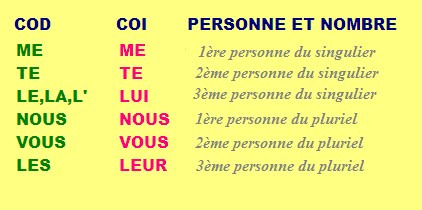Text
french class notes — 210823
niveau: intermédiaire
Les pronoms COD et COI
COD [complément d'objet direct] ↷ Les prépositions ne sont pas utilisées après le verbe. Example avec le verbe AIMER [direct]. Aimer quelq'un ou quelque chose. J'aime le chocolat → Je l'aime bien. [COD] Nous avons utilisé le pronom COD le pour éviter de répéter le mot "chocolat".
COI [complément d'objet indirect] ↷ Il faut utiliser la préposition après le verbe. Example avec le verbe ENVOYER À [indirect]. J'ai envoyé le cadeau à Olivia. → Je lui ai envoyé le cadeau. [COI] ou J'ai envoyé le cadeau à Olivia. → Je le lui ai envoyé. [COD et COI]
L'ordre générale des pronoms pronom sujet + pronom object direct/indirect + verbe
À l'impératif les pronoms viennent après le verbe: ✶﹒Compléte-les. ✶﹒Regarde-le.

8 notes
·
View notes
Text
듀오링고 vocab!! 彡 ☆
𑁯 원피스: dress
𑁯 시츠: shirt
𑁯 안경: glasses
𑁯 모자: hat
𑁯 가면: mask
𑁯 손목시계: watch
𑁯 넥타이: neck tie
𑁯 입다: to wear
𑁯 써다: to use, to wear
𑁯 계시���: to be, to stay (polite)
𓂅 그녀의 애인이 운동을 많이 해. [her significant one exercises a lot]
𓂅 제 애인은 똑똑해요. [my significant one is smart]
𓂅 할아버님깨서 원피스릴 입고 계세요. [grandfather is wearing a dress]
𓂅 아름다운 여자는 안경을 써요. [beautiful women wear glasses]
𓂅 뱀이 검은 모자를 쓰고 있어요. [the snake is wearing a black hat]
𓂅 아름다운 가면. [beautiful mask]
𓂅 넥타이를 매지 않는 남자는 영어를 못합니다. [the man who's not wearing a tie can't speak english]
𓂅 옷을 갈아입으세요. [change your clothes]
7 notes
·
View notes
Text
하다 — TO DO
declarative past
informal low: 했어
formal low: 했다
formal medium: 했어요
formal high: 했습니다
inquisitive past
informal low: 했어?
formal low: 했니?
formal medium: 했어요?
formal high: 했습니까?
declarative present
informal low: 해
formal low: 한다
formal medium: 해요
formal high: 합니다
inquisitive present
informal low: 해?
formal low: 하니?
formal medium: 해요?
formal high: 합니까?
declarative future
informal low: 할 거야
formal low: 할 거다
formal medium: 할 거예요
formal high: 할 겁니다
conditional future
informal low: 하겠어
formal low: 하겠다
formal medium: 하겠어요
formal high: 하겠습니다
imperative
informal low: 해
formal low: 해라
formal medium: 하세요
formal high: 하십시오
propositive
informal low: 해
formal low: 하자
formal medium: 해요
formal high: 합시다
other:
connective if: 하면
connective and: 하고
nominal -ing: 함
150 notes
·
View notes
Text
안녕하세요! ૮ . . ა (tradução em português depois do texto em inglês)
🇺🇸:
☆ i'm ivie, this is my side blog where i'll post some of my notes regarding the korean language (like words and expressions, translations, study tips and more)
☆ this is my attempt to keep improving in korean while also sharing my notes with other fellow students. english is not my first language and i am not qualified in teaching. so, please, feel free to contact me if something i posted doesn't feel 100% accurate!
☆ if you have any suggestions, things you wanna discuss or anything, feel free to send me an ask ( ´ ▽ ` )ノ
☆ that's all, hope y'all enjoy the content ^^
🇧🇷:
☆ meu nome é ivie, esse é meu blog secundário onde eu vou postar algumas anotações minhas com relação ao coreano (como palavras, expressões, traduções, dicas de estudo e etc)
☆ essa é minha tentativa de continuar melhorando no coreano enquanto compartilho minhas notas com outras pessoas (pois sei o quanto é difícil achar conteúdo de coreano gratuitamente e em português). eu não sou professora de linguística, então podem me contatar caso vocês achem alguma coisa no meu conteúdo que não esteja 100% certo ou não bata com a informação prévia de vocês!
☆ se tiverem alguma sugestão, algo pra discutir ou compartilhar, pode mandar um ask pra mim :)
☆ é só isso, espero que gostem ^^
#study blog#korean study blog#korean langblr#notes#korean notes#south korea#hangul#hangukeo#aprender coreano#língua coreana#pt br
1 note
·
View note